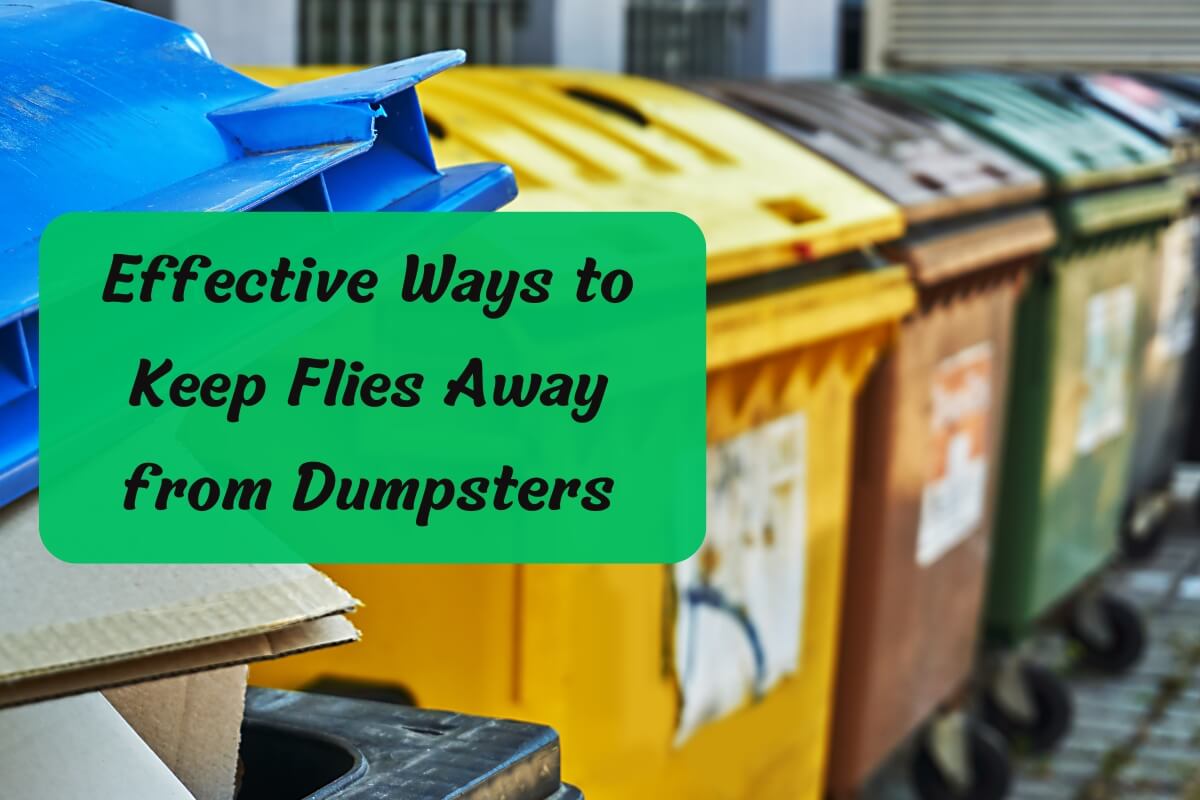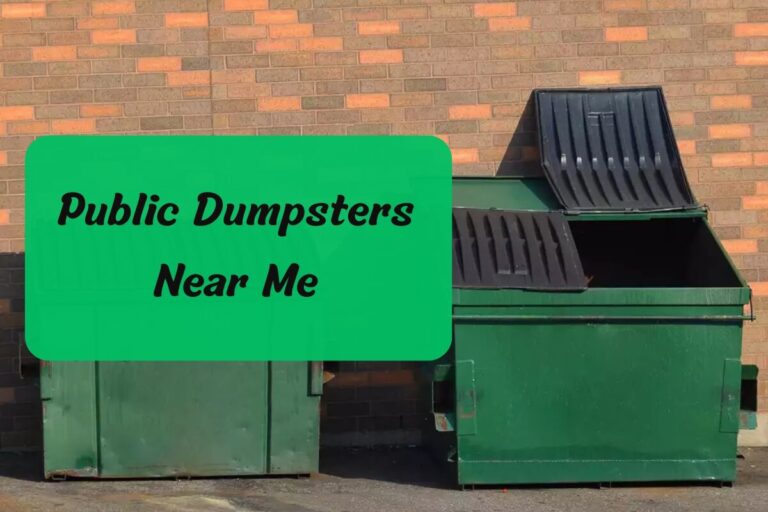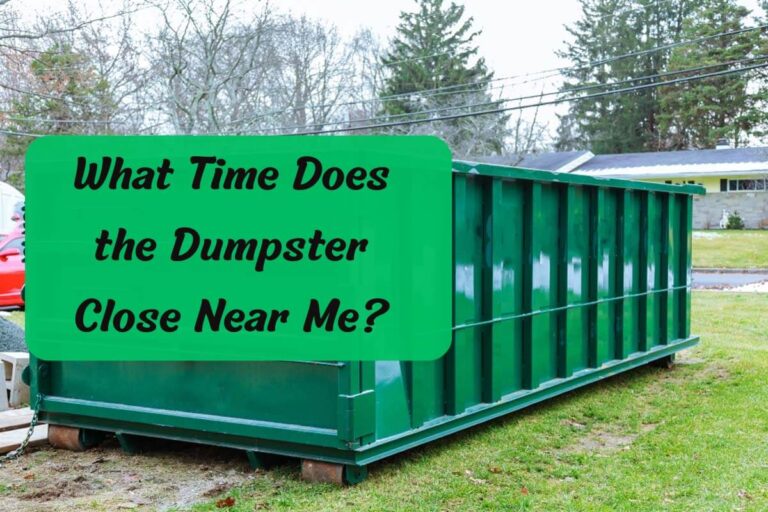
Dealing with flies swarming around your dumpster can be frustrating and unsanitary. These pesky insects are not only a nuisance, but they can also spread diseases and contaminate surfaces. The good news is that there are several methods to keep flies away from dumpsters, ranging from natural repellents to professional pest control services.
In this complete guide, we will explore various techniques to combat the fly problem around your dumpster. We’ll cover everything from preparing your dumpster for prevention to using physical barriers, chemical controls, and proper waste management practices. By implementing these strategies, you can create an inhospitable environment for flies and maintain a cleaner, safer area around your dumpster.
Understanding the Fly Problem
Before we dive into the solutions, it’s essential to understand why flies are attracted to dumpsters in the first place. Flies are drawn to organic waste, moisture, and warm temperatures, making dumpsters an ideal breeding ground for them.
Dumpsters contain food scraps, spoiled items, and other organic matter that provide a source of food for flies. Additionally, the moisture and warmth inside the dumpster create a perfect environment for flies to lay their eggs, which hatch into maggots and eventually turn into adult flies, perpetuating the cycle.
Apart from being a nuisance, flies can pose serious health risks. They are known to carry and spread various diseases, such as salmonella, E. coli, and typhoid fever. Flies can also contaminate surfaces and food, making it crucial to control their populations, especially in areas where food is prepared or consumed.
Preparing Your Dumpster for Fly Prevention
The first step in keeping flies away from your dumpster is to make it as unappealing as possible for these insects. Here are some essential preparation tips:
- Clean and disinfect the dumpster regularly. Use a strong cleaning solution or a mixture of vinegar and water to remove any organic matter buildup inside the dumpster. This will eliminate potential food sources and breeding grounds for flies.
- Repair any cracks or holes in the dumpster. Flies can squeeze through tiny openings, so it’s important to seal any gaps or cracks to prevent them from entering the dumpster.
- Use tight-fitting lids. Dumpsters with secure, well-fitting lids will make it harder for flies to access the contents inside. Make sure the lids close properly and don’t leave any gaps for flies to enter.
Natural Repellents for Dumpsters
If you prefer a more eco-friendly approach, there are several natural repellents that can help keep flies away from your dumpster. Here are some effective options:
- Essential oils: Certain essential oils, such as citronella, peppermint, and eucalyptus, are known to repel flies. You can create a homemade fly repellent spray by mixing a few drops of these oils with water in a spray bottle. Alternatively, you can place cotton balls soaked in the essential oils around the dumpster area.
- Herbs and plants: Certain herbs and plants, like lavender, mint, and basil, have strong scents that flies dislike. You can grow these plants around the dumpster area or place fresh sprigs inside the dumpster.
- DIY fly repellent sprays: You can make your own fly repellent sprays using ingredients like vinegar, dish soap, and essential oils. These homemade solutions can be sprayed around the dumpster to deter flies.
Physical Barriers and Traps
If natural repellents aren’t enough, you can try using physical barriers and traps to keep flies away from your dumpster. Here are some options:
- Install screens or mesh covers: Covering the dumpster with fine mesh screens or netting can prevent flies from gaining access to the contents inside.
- Use fly traps: Fly traps, such as adhesive strips or baited traps, can be placed around the dumpster area to capture and eliminate flies.
- Fans or air curtains: Setting up fans or air curtains near the dumpster can create a strong airflow that flies find difficult to navigate, deterring them from entering the area.
Chemical Controls
For severe fly infestations, use chemical controls carefully and follow label instructions for safety. Options include:
- Insecticide sprays: Insecticide sprays containing active ingredients like pyrethrins or permethrins can be effective in killing adult flies. These sprays can be applied around the dumpster area or directly onto fly-infested surfaces.
- Insecticidal baits: Baits containing insecticides can be placed near the dumpster to attract and kill flies.
- Professional pest control services: If you’re dealing with a serious fly problem, it may be best to hire a professional pest control service. They have access to stronger chemicals and techniques that can effectively eliminate fly infestations.
Proper Waste Management
Proper waste management plays a crucial role in keeping flies away from dumpsters. Here are some best practices:
- Regular dumpster cleaning and maintenance: Regularly cleaning and disinfecting the dumpster will remove any organic matter that could attract flies.
- Avoiding moisture buildup: Ensure that the dumpster area is well-drained and free of standing water, which can create a breeding ground for flies.
- Timely disposal of organic waste: Don’t let organic waste accumulate in the dumpster for too long. Schedule regular pickups or dispose of organic waste more frequently to minimize the attractants for flies.
Additional Tips and Tricks
Here are some additional tips and tricks that can help keep flies away from your dumpster:
- Use enzymatic cleaners: Enzymatic cleaners break down organic matter, making it less attractive to flies.
- Plant repellent plants around the dumpster area: Certain plants, like marigolds, chrysanthemums, and petunias, can help repel flies due to their strong scents.
- Maintain proper drainage: Ensure that the area around the dumpster is well-drained to prevent the accumulation of standing water, which can attract flies.
Integrated Pest Management Approach
For maximum effectiveness, it’s recommended to use an integrated pest management (IPM) approach. This involves combining multiple methods, such as physical barriers, chemical controls, and cultural practices (like proper waste management), to create a comprehensive strategy for keeping flies away from your dumpster.
Monitor the fly population regularly and adjust your strategies as needed. Different methods may work better depending on the infestation severity and dumpster area conditions.
FAQs about Keeping Flies Away from Dumpsters
Here are some common questions and concerns related to keeping flies away from dumpsters:
Can I just use insecticides to get rid of flies around my dumpster?
Insecticides can work, but use them with other methods like proper waste management and physical barriers. Relying only on insecticides may not work in the long run and can harm the environment.
How often should I clean my dumpster to prevent fly infestations?
It’s recommended to clean and disinfect your dumpster at least once a week, or more frequently if the dumpster is heavily used or during warmer months when fly activity is higher.
Can I use essential oils directly on my dumpster?
While essential oils can be effective fly repellents, it’s best to dilute them with water or use them on cotton balls or in spray form. Applying undiluted essential oils directly to surfaces may cause staining or damage.
Will keeping the dumpster lid closed prevent all flies from entering?
Keeping the dumpster lid closed helps, but it’s not enough to keep flies out. They can still squeeze through small gaps. Combining lid closure with traps, repellents, and proper waste management is best.
How long does it take for fly traps or baits to work?
The effectiveness of fly traps and baits can vary depending on the product and the severity of the infestation. Generally, you should start seeing a reduction in the fly population within a few days to a week of using these products. However, for complete elimination, it may take several weeks of consistent use and reapplication as needed.




